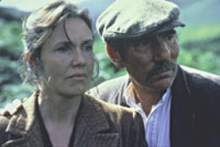
Who had the idea to make the film?
It was Robert who runs Hallmark who I'd been working with for years, he came into the office one day and asked me to help him do the film. It wasn't a very good script, I was slightly dubious about doing it but it just grew in me as we started to scout locations and find the animals.
It must have been incredibly difficult to adapt.
Hugely difficult. It's a very dark and heavy film and I'm amazed that audiences can lock on to it for its duration because it's quite tough.
How did you try to overcome that?
Well I didn't try to overcome it because I needed it to be bleak. The only thing we did was tack on a slightly less bleak ending than George Orwell intended and in many ways that may have been a mistake. It was something that I wrangled with the producers for a while, I think it should have remained dark.
How have the Orwell estate received it?
Good. I worked with them quite closely and they like the film a lot, they've said so in the press a number of times and that mattered to me more than anything else, I don't care what other people thought. It's an amazing book.
Why did you feel it was necessary to have the Americans saving the day?
Well it's not so much that they save the day, it's a fear of the same thing happening again. The men are back or repression's back, it wasn't the beautiful, white and clean living Americans arriving to put everything straight - I feel uneasy about the ending because a lot of people have interpreted it that way. It's wrong.
Do you think the themes of the book and now the film still relevant today?
Yes they are, it's not something that's going to knock the socks off people for it's insight because we all know what has happened and what does happen. When the book was written people didn't know, they expected communism to be a fantastic formula. It was a disaster unfortunately despite coming from the right ideas but the film doesn't tell that story because we already know that story, what's amazing is that the characters are structured.
Why didn't you choose to contemporise it?
I needed to set it in the past because the relevance of carthorses was important, If I'd set it now the gravity of Boxer's death wouldn't have been evident - Boxer was the farm's heavy haulage. I set it in the 50's rightly or wrongly, it was the age of the birth of television, it was the important to have all that coming through so that we could see how society would be affected in an Orwellian way.
Did you refer to the original animated version?
Not at all. In fact I'd seen the original version throughout, I still haven't watched it again but I probably could do now. No I didn't refer to it at all.
I thought one should never work with children or animals.
Or puppets! The animals were ridiculous actually. I don't think I could ever have made the film anywhere but in Ireland but that's mainly to do with the conditions. There was also a typically Irish laissez faire attitude with the training of the animals because I'd previously experienced the rigid control of American animal trainers on things like Babe. I will say though that the women that trained the dogs were just fantastic, that dog Jesse was remarkable but some of the other animal training was a little bit hit and miss really. They did everything they could and they were very willing under difficult conditions, we didn't have much control.
There was a surprisingly large human element in the film, why was that?
That was just to relieve the audience really, the book is all animals the whole way through and they only talk about what's happening in the human world but you actually ever see it. I needed to get away from the animals because they just don't sustain for that long so I had to create a bigger human plot just to give me a place to go.
Where did you shoot it?
Well it needed to be shot in Europe I think. I couldn't have shot it in America because it just wouldn't have been right, we looked all over the place and it just came down to that location really.
It looked at times as though you'd seen a certain location and shot something on the spur of the moment.
No, everything was visualised and storyboarded before we found that location. There's an awful lot of symbolism in the film, a lot of ancient attitudes.
Do you think your effects background was paramount in attempting a film like that?
Oh yes, I don't think it could have been shot by someone without those skills. When you consider that you can't shoot more than 2 animals on their own, everything is composite throughout. I don't think I came back from Ireland with one complete shot, it was an endless jigsaw puzzle of component shots - I didn't even have any sound.

What was the budget?
$22m but it should have been$32m ideally.
Can you tell us what you are working on now?
I can. Three films in various stages of development. One of them is 5 Children and It which I hope to be shooting this summer somewhere in Europe, most of it is studio based but some of it will be on location - it may even end up in Ireland again. It's written by E Nesbitt who wrote The Railway Children and it's a period piece. There's a film that I've co-written about very large, powerful and dangerous racing cars that tend to take off and explode. We've written it and we about to start talking about financing so I'd like to do that a year after and there's a book that I can't talk about because I'm still trying to option it. It's by a famous contemporary English writer and it's set in the North East of England.
Why do you think there have been so many films based in that region of late?
Well I'm not sure there have been that many, there's Brassed Off, The Full Monty, Billy Elliot, well it's dramatic, enigmatic and they are deprived people with a huge amount of dignity I think. There's not much one can write about in Merton Park or Cheam, there's probably been as many shot in the East End which is another place where you find strong communities and there's a lot of soul there. The same's true of Ireland, it's these qualities that filmmakers are looking for.
Why did you choose to shoot in Ireland and not in the UK?
At one point we were going to shoot it all at Shepperton Studios but I guess Ireland seemed right - we also did a recce in Australia but that was to do with money. It would have been a very different film had we shot it there, Babe was shot in Australia but I needed that dark and real muddy look.
How much of the animal footage was real animal?
Well the pigs were real and what people don't realise is that Boxer the horse was mostly animatronic, also the donkey. Some of it is very good and as always with animatronic it's the odd shot that lets down the rest, I reckon 50% of the animatronic shots you wouldn't even think about.
Is there anything you'd change looking back?
The ending. I think we should have finished the film looking into the farm through the broken wall, you could have said that survivor thing and faded out to the titles.
Why isn't it being released in the UK?
There isn't a distributor who's willing to release it, I don't actually think anybody is trying very hard to be honest. Basically it was financed for TV purposes and now that is out of the way but I know they looked for a UK distributor. I don't think they are that bothered really - it did what it was designed to do. I don't think it fits too comfortable into the film demographic as it stands at the moment.
What would you tell someone to do if they wanted to work in special effects?
Come and talk to me. London is fantastic for effects, we are really good at it and of course there are probably 4 or 5 big visual effects companies in London that are very good indeed. As far as animatronics is concerned I think the Creature Shop is the best, certainly in this country. You need to find an organisation that is big enough to teach you - places like The Mill and the Creature Shop. Go to art school, or film school, come and see me, make the tea and help people for a year or two and you'll be in.